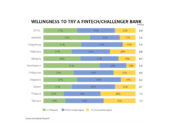
Digibanks are Coming to Singapore and It Promises to Shake up the Banking Industry
by Fintech News Singapore April 21, 2020With Singapore set to deliver its first digital banking licenses later this year, the city-state is preparing for a new era in banking.
In June 2019, the Monetary Authority of Singapore (MAS) announced that it would issue up to five digital banking licenses in an effort to open up the banking sector and add market diversity.
A total of 21 applications were submitted, MAS said in January, with bidders that include Ant Financial, ByteDance, Sea, as well as a Grab/Singtel consortium.
Some analysts argue that the impact on established lenders will likely to be limited given that Singapore is already home to some of the most digitally savvy lenders in the world. Others, however, believe that the impending entrance of digital banks will shake up the banking sector, forcing incumbents to rethink their business.
Digital banking on the rise
Though it’s still unclear what the market will look like after Singapore welcomes its first digital banks, what’s undeniable, however, is that challenger banks are now a global phenomenon and have attracted millions of customers with their low-cost and mobile-centric offerings.

NuBank, from Brazil, is currently the world’s largest challenger bank by number of users with 15 million customer accounts. It is followed by South Korea’s KakaoBank (10 million customer accounts), and the UK’s Revolut (6 million customer accounts), according to a new report by Finastra, a fintech company that provides infrastructure for platforms such TONIK, a licensed digital-only bank in the Philippines, and Gravity, a new bank based in the UK.
 In Singapore, customers are rapidly warming up to the idea of banking with non-traditional players.
In Singapore, customers are rapidly warming up to the idea of banking with non-traditional players.
According to a study by Visa unveiled in late-March, 75% of Singaporeans would be willing to bank with established companies that are not in the financial services industry or with companies that are within the sector, and another 63% would bank with new startups.
Convenience (54%) and faster services (52%) were cited as the top two reasons why Singaporean customers would choose a digital bank.
“The digital banking space in Singapore and Southeast Asia is set for a year of unprecedented growth, setting the stage for the next revolution in banking,” predicts Kunal Chatterjee, country manager for Singapore and Brunei, at Visa. “When the region shifts to a millennial, digital-led demographic, more consumers will expect digital-first experiences and want their banking and payments to match the speed and convenience of their user journeys.”
But it’s not just Singapore. Hong Kong, Malaysia and Taiwan have all introduced digital banking licenses in the past year or so, showcasing that regulators across the region are committed to catching up with western peers.
MAS will be announcing the successful bidders for its digital banking licenses in the second half of 2020 with these companies expected to commence business by mid-2021.
Until then, check out this webinar the Fintech News Network will be hosting on April 29, 2020, at 2pm SGT. For this online event, leading experts from Finastra, Razer Fintech, Matchmove and PwC will be joining us to discuss the future of banking in Singapore, discover how digital banks will change the way we bank today, and have your burning questions answered live. Register here!
Featured image credit: Unsplash








